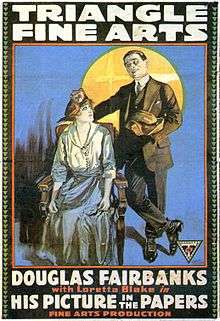His Picture in the Papers
His Picture in the Papers is a 1916 American silent comedy film written and directed by John Emerson. Anita Loos also wrote the film's scenario. The film stars Douglas Fairbanks and Loretta Blake and features Eric von Stroheim in a minor role.[2]
| His Picture in the Papers | |
|---|---|
 Film poster | |
| Directed by | John Emerson |
| Written by | John Emerson Anita Loos |
| Starring | Douglas Fairbanks Loretta Blake |
| Cinematography | George W. Hill |
Production company | Fine Arts Picture Company |
| Distributed by | Triangle Film Corporation |
Release date |
|
Running time | 62 minutes |
| Country | United States |
| Language | Silent (English intertitles) |
| Budget | $42,599.94[1] |
Plot
Pete Prindle, son of Proteus, is a vegetarian health food manufacturer who wishes to marry Christine Cadwalader. She agrees. However, Proteus considers his son lazy, with no contributions to the company and therefore undeserving of his father's wealth. His daughters have their pictures in the newspapers, pictures of them promoting the company products. Cassius refuses to consent to his daughter's hand since he believes Pete to be lazy as well, with no real stake in his father's company. Pete tries hard to get in the newspaper: He fakes a car accident, which gets an insignificant mention in the paper. He wins a boxing match, which turns out to be an illegally run ring which ends up being raided by police.
After a misunderstanding, he washes up on the shore in his pajamas after falling off a cruise ship, and proceeds to beat two police officers, his name is withheld by the newspaper. Finally, he saves many people on a train from a group of thugs intent on murdering Cassius by preventing a collision with another rail car. He receives a front-page article in every major local newspaper and a large photo as well which pleases everyone.
Cast
- Douglas Fairbanks as Pete Prindle
- Clarence Handyside as Proteus Prindle
- Rene Boucicault as Pansy Prindle
- Jean Temple as Pearl Prindle
- Charles Butler as Cassius Cadwalader
- Loretta Blake as Christine Cadwalader
- Homer Hunt as Melville
- Helena Rupport as Olga
- Eric von Stroheim as 'Eye Patch' Thug
Production notes
The film was produced by Fine Arts Film Company for $42,599.94, and distributed by the Triangle Film Corporation.[1][2] Portions of the film were shot at the Willat-Triangle Studio in Fort Lee, New Jersey.[3] Other sequences were shot in Yonkers and Atlantic City. A boxing scene featured in the film was shot at Sharkey's Athletic Club, a boxing club, on Columbus Avenue in Manhattan.[1]
This was the first Fairbanks film with a Loos scenario, and an early example of her intertitle style involving self-parady, sarcasm, slang, and puns.[4] For example, one title card near the end, referring to the character Pete, said "Ain't he the REEL hero?" The titles of the film were well received and Fairbanks signed a contract to have Loos do the intertitles for his next films.[4]
Preservation status
Prints of His Picture in the Papers are preserved in the Library of Congress,[2] George Eastman House Motion Picture Collection, and other archives.[5] It was also released on DVD by Flicker Alley.[6]
References
- Lennig, Arthur (2004). Stroheim. University Press of Kentucky. p. 35. ISBN 0-813-13750-0.
- "His Picture in the Papers (1916)". silentera.com. Retrieved May 29, 2013.
- Koszarski, Richard (2004). Fort Lee: The Film Town. Indiana University Press. p. 164. ISBN 0-861-96652-X.
- Frost, Laura (April 2010). "Blondes Have More Fun: Anita Loos and the Language of Silent Cinema". Modernism/Modernity. Johns Hopkins University Press. 17 (2): 296–97. doi:10.1353/mod.0.0213. Retrieved March 22, 2020.
- Library of Congress American Silent Feature Film Survival Database: His Picture in the Papers
- Keil, Charlie; Singer, Ben, eds. (2009). American Cinema of the 1910s: Themes and Variations. Rutgers University Press. p. 250. ISBN 0-813-54445-9.
External links
| Wikimedia Commons has media related to His Picture in the Papers. |
- His Picture in the Papers on IMDb
- His Picture in the Papers is available for free download at the Internet Archive